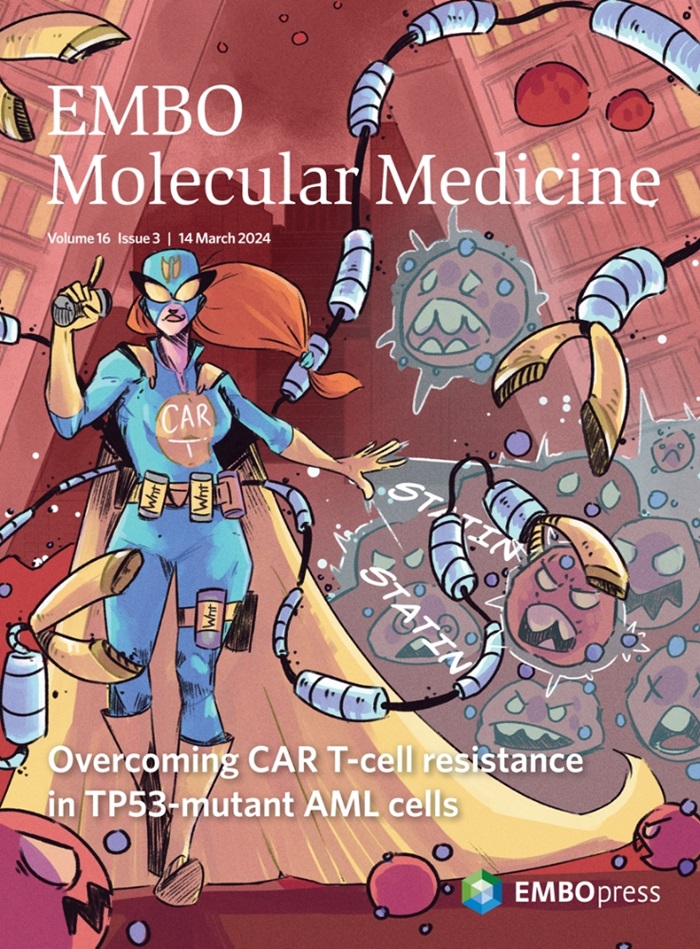冷暴露通过下调软骨中的APOE促进骨关节炎的进展。
IF 9
1区 医学
Q1 MEDICINE, RESEARCH & EXPERIMENTAL
引用次数: 0
摘要
骨关节炎(OA)是一种退行性关节疾病,有效治疗有限。寒冷的天气已被证明会影响OA患者的关节疼痛。然而,寒冷气候对OA进展的影响存在争议,其潜在机制尚未完全了解。本研究旨在阐明载脂蛋白E (Apoe)在寒冷暴露下骨性关节炎进展中与软骨细胞的作用。人软骨细胞RNA测序和DMM小鼠OA模型均显示,低温显著下调Apoe表达,与OA加重相关。软骨中Apoe的条件敲除加重了软骨退变,导致脂质积累、ROS产生增加、线粒体功能障碍和软骨细胞凋亡升高。RGX-104(一种LXRβ激动剂)治疗可逆转APOE表达,减轻异常脂质积累,并抵消冷暴露对OA进展的不利影响。这些结果表明,针对脂质转移和代谢,特别是通过Apoe调节,可能为居住在寒冷气候,如高海拔和纬度地区,甚至冬季的OA患者提供治疗策略。本文章由计算机程序翻译,如有差异,请以英文原文为准。
Cold exposure promotes the progression of osteoarthritis through downregulating APOE in cartilage.
Osteoarthritis (OA) is a degenerative joint disease with limited effective therapies. Cold weathers have been shown to affect joint pain in OA patients. However, the impact of cold climate on OA progression is debated, with the underlying mechanisms not fully understood. This study aims to elucidate the role of Apolipoprotein E (Apoe) in chondrocytes in relation to OA progression under cold exposure. Both human chondrocytes RNA sequencing and DMM mice OA model revealed that lower temperatures significantly downregulated Apoe expression, correlating with OA exacerbation. Conditional knockout of Apoe in cartilage aggravated cartilage degeneration, leading to lipid accumulation, increased ROS production, mitochondrial dysfunction, and elevated chondrocyte apoptosis. Treatment with RGX-104, an LXRβ agonist, reversely restored APOE expression, mitigated aberrant lipid accumulation and countered the detrimental effects of cold exposure on OA progression. These results suggest that targeting lipid transfer and metabolism, especially through Apoe modulation, may offer therapeutic strategies for OA patients residing in colder climates, such as those at high altitudes and latitudes, and even winter season.
求助全文
通过发布文献求助,成功后即可免费获取论文全文。
去求助
来源期刊

EMBO Molecular Medicine
医学-医学:研究与实验
CiteScore
17.70
自引率
0.90%
发文量
105
审稿时长
4-8 weeks
期刊介绍:
EMBO Molecular Medicine is an open access journal in the field of experimental medicine, dedicated to science at the interface between clinical research and basic life sciences. In addition to human data, we welcome original studies performed in cells and/or animals provided they demonstrate human disease relevance.
To enhance and better specify our commitment to precision medicine, we have expanded the scope of EMM and call for contributions in the following fields:
Environmental health and medicine, in particular studies in the field of environmental medicine in its functional and mechanistic aspects (exposome studies, toxicology, biomarkers, modeling, and intervention).
Clinical studies and case reports - Human clinical studies providing decisive clues how to control a given disease (epidemiological, pathophysiological, therapeutic, and vaccine studies). Case reports supporting hypothesis-driven research on the disease.
Biomedical technologies - Studies that present innovative materials, tools, devices, and technologies with direct translational potential and applicability (imaging technologies, drug delivery systems, tissue engineering, and AI)
 求助内容:
求助内容: 应助结果提醒方式:
应助结果提醒方式:


